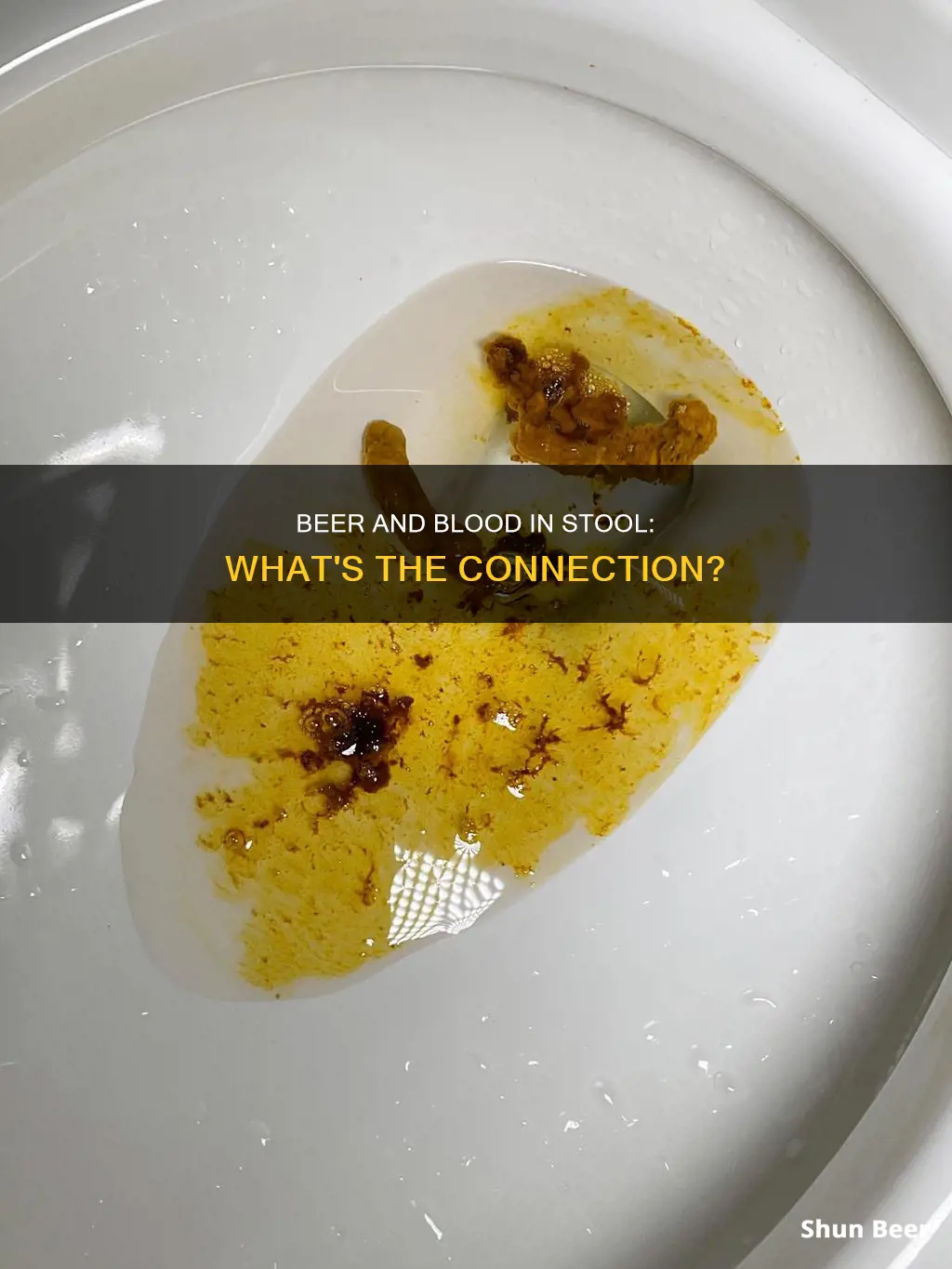
Drinking beer and other alcoholic beverages can have a significant impact on bowel movements. Alcohol can speed up or slow down digestion, leading to diarrhoea or constipation, respectively. It can also cause internal irritation and inflammation, and trigger irritable bowel syndrome (IBS). In addition, chronic alcohol abuse can lead to severe effects such as internal bleeding in the gastrointestinal (GI) tract, which may be life-threatening. If you notice blood in your stool after drinking beer, it is important to seek medical advice as it could indicate gastrointestinal haemorrhage, which can become fatal if left untreated.
| Characteristics | Values |
|---|---|
| Can drinking too much beer cause gastrointestinal bleeding? | Yes |
| What is gastrointestinal bleeding? | Bleeding found anywhere in the digestive system, from the mouth to the rectum |
| What are the symptoms of gastrointestinal bleeding? | Vomiting red or black blood, blood in the stool, or black stool |
| What causes gastrointestinal bleeding? | Peptic ulcers, diverticulosis, GERD, alcohol, liver disease, colon polyps, tumors, inflammatory bowel disease, anal fissures, proctitis, etc. |
| What is the most common cause of gastrointestinal bleeding? | Peptic ulcers |
| What is the second most common cause of gastrointestinal bleeding? | Diverticulosis |
| What is GERD? | Gastroesophageal reflux disease, a form of acid reflux that causes irritation and inflammation in the lower esophageal sphincter |
| What is diverticulosis? | Small pockets or pouches that develop in the lining of the digestive tract |
| What is a peptic ulcer? | A sore that develops on the small intestine or the stomach lining |
| What is the role of alcohol in gastrointestinal bleeding? | Alcohol can tear away at the tissue in the digestive tract, causing it to become sensitive and prone to tears called Mallory-Weiss tears, which can result in significant bleeding |
| How does alcohol affect the gastrointestinal tract? | Alcohol can cause stomach inflammation, decreased nutrient absorption, diarrhea, dehydration, Crohn's disease flares, and irritable bowel syndrome flares |
| How to lessen the effects of alcohol on the gastrointestinal tract? | Drink in moderation, avoid drinking on an empty stomach, avoid caffeinated drinks, drink plenty of water, avoid artificial sweeteners or sugars |
What You'll Learn

Alcohol can cause gastrointestinal bleeding
Alcohol can have a significant impact on the gastrointestinal tract, and in some cases, it can lead to gastrointestinal bleeding. This type of bleeding can occur anywhere in the digestive system, from the mouth to the rectum, and can be life-threatening if not addressed promptly.
When an individual consumes excessive amounts of alcohol, it can irritate and inflame the digestive tract. This irritation can lead to gastrointestinal bleeding through several mechanisms. Firstly, alcohol can cause Mallory-Weiss tears in the tissue of the digestive tract, which can result in significant bleeding. These tears can occur anywhere from the throat to the intestines. Additionally, alcohol can reduce the tone of the lower esophageal sphincter, leading to increased gastroesophageal reflux. The acid reflux associated with this condition can irritate and damage the mucosal barrier of the esophageal mucosa, further contributing to bleeding.
Alcohol consumption also has a detrimental effect on the stomach. It increases gastric acid secretion, which can lead to mucosal damage and hemorrhagic gastritis. The risk of developing duodenal ulcers is also elevated in individuals who consume excessive amounts of alcohol. Furthermore, alcohol can cause stomach inflammation, decreased nutrient absorption, and dehydration, all of which can contribute to gastrointestinal issues and increase the risk of bleeding.
The consumption of alcohol, especially in excessive amounts, is a well-known risk factor for gastrointestinal bleeding. It is important to note that the impact of alcohol on the gastrointestinal tract can vary depending on the amount consumed and individual factors. However, to mitigate the harmful effects of alcohol on the gastrointestinal tract, it is advisable to drink in moderation, avoid drinking on an empty stomach, and stay hydrated by consuming plenty of water.
Beer and Vicodin: A Risky Mix?
You may want to see also

Drinking on an empty stomach can be harmful
Consuming large amounts of alcohol on an empty stomach can be very dangerous and even life-threatening. Alcohol poisoning is a life-threatening condition that requires immediate medical attention. Symptoms of alcohol poisoning include difficulty remaining conscious, slow or irregular breathing, low body temperature, and bluish skin colour or paleness.
Drinking on an empty stomach can also increase the risk of a hangover, which is usually harmless but unpleasant. A hangover can cause dizziness, inability to concentrate, mood issues, and sensitivity to light and sound.
Additionally, drinking without eating can contribute to "drunkorexia," a harmful practice where individuals starve themselves during the day to compensate for the calories consumed in alcohol. This can lead to weight gain and nutrient depletion, as alcohol provides empty calories and no nutritional benefits.
To minimise the harmful effects of drinking on an empty stomach, it is recommended to eat at least an hour before drinking, limit consumption to one standard drink per hour, and know your personal alcohol tolerance. Choosing lower-alcohol beverages, diluting drinks with water, and drinking water simultaneously can also help mitigate the negative consequences.
Pilsner Glasses: Best Beers to Enjoy in This Glassware
You may want to see also

Alcohol can cause diarrhoea
Alcohol can have a significant impact on the digestive system, and in some cases, it can cause diarrhoea. This is due to several factors, including the amount of alcohol consumed, the type of alcohol, and the presence of any underlying health conditions.
Firstly, alcohol can irritate and inflame the gastrointestinal tract, leading to increased contractions in the colon and faster digestion. This agitation in the intestines can result in diarrhoea as the body tries to expel the contents of the intestines more quickly. The inflammation caused by alcohol can also lead to increased acid production in the stomach, further contributing to irritation and diarrhoea.
Secondly, alcohol affects water absorption in the large intestine. Typically, the large intestine absorbs liquid from the stool before passing it out of the body. However, when alcohol is present, the large intestine does not function optimally, resulting in liquid stools and dehydration. This dehydration caused by alcohol consumption can also lead to constipation, as the body tries to retain more fluid.
Additionally, binge drinking or consuming multiple alcoholic drinks in quick succession can overwhelm the body, leading to diarrhoea. The body struggles to break down heavy foods and alcohol simultaneously, and the high amount of alcohol can disrupt the normal functioning of the digestive system.
People with certain health conditions, such as irritable bowel syndrome (IBS), are more susceptible to alcohol-induced diarrhoea. Alcohol can trigger flares in people with inflammatory bowel disease (IBD), including Crohn's disease and ulcerative colitis, leading to diarrhoea and other symptoms.
Furthermore, the type of alcohol consumed can also play a role. Beer, for example, has more carbohydrates than other forms of alcohol, and the body may have difficulty breaking them down while processing alcohol. Wine may cause diarrhoea in individuals sensitive or allergic to tannins, and mixed drinks high in sugar can worsen diarrhoea by accelerating the expulsion of intestinal contents.
To alleviate alcohol-related diarrhoea, it is recommended to limit caffeine intake, stay hydrated, and consume bland, easily digestible foods. If diarrhoea persists or is accompanied by other concerning symptoms, it is important to consult a healthcare professional.
Beer and Cramps: Is There a Link?
You may want to see also

Alcohol can cause constipation
Drinking too much beer can cause gastrointestinal bleeding, which presents as blood in the stool, or black stool. This is caused by tears in the tissue of the digestive tract, which alcohol can make more sensitive.
Alcohol can also cause constipation. Here are some ways in which alcohol consumption can lead to constipation:
Dehydration
Alcohol prevents the body from releasing vasopressin, a hormone that helps the body retain fluid by preventing water from leaving the body in urine. With less vasopressin, the body gets rid of more fluid than normal, which can lead to constipation. It is important to drink plenty of water or other fluids to stay hydrated and prevent constipation.
Slower muscle movement in the gut
Drinks with a high alcohol content (more than 15%) may slow down the movement of muscles in the gut that push food through the digestive system.
Diuretic effects
Alcohol acts as a diuretic, which causes the body to make more urine than normal. This can lead to dehydration, as the body is urinating more often but not taking in enough fluids.
Irritation and inflammation in the intestines
Alcohol can irritate the intestines and cause inflammation, which makes it difficult for the intestines to absorb water. This leads to a hard, dry stool that is difficult to pass.
Beer and Shraddha: A Spiritual Conundrum for Devotees
You may want to see also

Alcohol can lead to dehydration
Drinking too much beer can cause gastrointestinal bleeding, which presents as blood in the stool. This is caused by tears in the tissue of the digestive tract, known as Mallory-Weiss tears. Alcohol can also lead to dehydration, which can compound the issue of gastrointestinal bleeding.
The dehydration caused by alcohol consumption can be mitigated to some extent by drinking water alongside alcoholic drinks. However, this will not completely eliminate dehydration, as the body will still produce more urine than usual due to the effects of alcohol on ADH production. Additionally, increased urination caused by alcohol consumption can deplete electrolyte levels in the body, leading to an electrolyte imbalance, which has been linked to hangover symptoms such as headaches, nausea, and body aches.
To summarise, alcohol consumption can lead to dehydration through its effects on ADH production and its diuretic properties. This dehydration can be partially mitigated by drinking water, but it is difficult to avoid completely. The dehydration caused by alcohol consumption can have negative short- and long-term effects on the body, including impaired coordination, judgement, and ability to perceive and respond to hazards.
Energy and Alcohol: Do Beer and Red Bull Work?
You may want to see also
Frequently asked questions
Yes, drinking too much beer can cause gastrointestinal bleeding, which can lead to blood in your stool. This is often caused by tears in the tissue of the digestive tract, known as Mallory-Weiss tears.
Symptoms of gastrointestinal bleeding include vomiting red or black blood, blood in the stool, or black stool. This condition can range from mild to severe and can become life-threatening if left untreated.
If you notice blood in your stool or experience any other concerning bowel-related symptoms after drinking beer, it is important to contact your doctor right away. They will be able to advise you on the best course of action and recommend any necessary tests or treatments.
To lessen the effects of beer on your gastrointestinal tract, it is recommended to:
- Drink in moderation.
- Avoid drinking on an empty stomach.
- Avoid drinks with caffeine or high amounts of sugar or artificial sweeteners.
- Drink plenty of water to stay hydrated.







